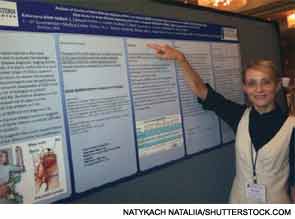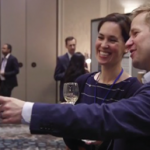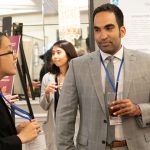
When I last contributed an article to The Rheumatologist, in June 2012, I had just begun my fellowship. This year, I write from a different perspective. I am better clinically. I know what I am talking about in rheumatology, at least half of the time. I know the people with whom I work. I know the best way to get from one part of the hospital to another, and I usually can find my way back to the parking lot. I am less frequently surprised by unanticipated medical issues that used to startle me, like a jumping jack-in-the-box. The charm of the first year is gone, but I appreciate the comfort zone that comes with the second year of fellowship training.
When I received an e-mail about the recent ACR/AF Rheumatology Research Workshop being held in Dallas where I am a fellow, I was eager to sign up. There was, of course, a caveat—participation required the submission of a research project. When I asked my program director about the event, he explained that the workshop was geared toward those fellows who were destined for careers in academia. Well what about me, still undecided and tenuous about the direction of my postfellowship career? Could I claim a home-turf advantage and participate without submitting a research project? Well, of course not.
I did, however, have something up my sleeve. During medical school and residency, I worked on a variety of projects, ranging from the effects of gastric bypass on hormone secretion to the sexual practices of medical students. One study, which I started during my residency and nearly completed, assessed the quality of bone marrow aspirates and biopsies. I was able to finish the study, submit it, and was happy to learn that it was accepted. I officially became a workshop participant.

Lessons on Science and Presentation, with Stingray
The first day’s lectures dealt with basic research topics, including genomics in rheumatology, novel therapies for rheumatoid arthritis, and animal models of rheumatic disease. Hermine Brunner, MD, a pediatric rheumatologist at Cincinnati Children’s Hospital, presented an overview of trial designs. Then Judith Smith, MD, assistant professor of pediatrics at the University of Wisconsin, Madison, detailed the role of anti–interleukin 23 therapy for the treatment of ankylosing spondylitis.
Later that day, Gary Firestein, MD, dean and associate vice chancellor of translational medicine at the University of California San Diego School of Medicine, shared some memorable anecdotes about a surfing accident and getting stung by a stingray. It was interesting how Dr. Firestein adopted this terrifying and painful (13/10 on pain scale) experience to his topic and presented ultrasound imaging of his injured foot during the opening slides of his talk on epigenetics. I had not known that, on some California beaches, you must shuffle in the ocean to avoid podiatric impalement by the stingrays. I contemplated changing my retirement plan after this talk, but concluded that, in my later years, I will be shuffling anyhow, no matter where I live.
The evening culminated with a mass migration of attendees to the ballroom for poster presentations. I found it intriguing that the poster viewing was combined with the reception. My impression was that the simultaneous service of wine and appetizers lent a different perspective to the task, promoting a more relaxed, and perhaps candid, exchange of ideas and comments about your work or the work of others that might otherwise not be achieved.
After the reception and poster presentation, dinner was served. As luck would have it, I was seated at the same table as the evening’s feature speaker, Teresa Tarrant, MD, assistant professor of medicine at the University of North Carolina at Chapel Hill. During her talk, Dr. Tarrant provided a very interesting and personal overview of her career path, focusing on the development of mentorships and professional friendships that influenced and guided her early career as a clinician scientist.
The following morning at breakfast, I was fortunate enough to be seated at the same table as Dr. Firestein, whom I grilled for more details about his injury. In addition to discussing the hazards of marine biology, we also managed to have quite a stimulating discussion about therapeutic agents for lupus.
I must admit to having anxiously awaited the second day of this conference. The topics were directly career related, and the much-anticipated group discussion of our posters was scheduled to commence following breakfast. The idea of the poster workshop was to present one’s work to a very small group of other fellows, young investigators, and a few selected faculty mentors. The small group setting promoted a very friendly and constructive atmosphere for this exercise. My judges included ACR President Audrey Uknis, MD, and Dr. Brunner. Both were eager to share valuable feedback and comments. I found this exercise very useful, and enjoyed listening to the exchange of ideas between the judges and the various presenters.
Career Consideration
Later that morning, some other fellows and I had a chance to visit the nearby Dallas Museum of Art. Admission is free, and the art is priceless. We saw a very timely exposition on the life of John F. Kennedy that coincides with this year’s 50th anniversary of the president’s assassination. Stimulated by the perspective offered by the JFK exhibit, another fellow and I found ourselves discussing “big picture” issues that dominate such a large part of our lives: future careers and family life.
Back at the conference center, we had a boxed lunch with round table discussions about applying for grants, work–life balance, and collaborations. The afternoon’s activities consisted of talks related to research opportunities and sources of funding for young researchers, including tips about securing federal and state grants. The dynamic Peter Merkel, MD, professor of medicine at the University of Pennsylvania in Philadelphia, presented some sage advice on how to achieve success with your grant application.
The next speaker, Bevra Hahn, MD, professor of medicine and chief of the division of rheumatology at the University of California, Los Angeles, David Geffen School of Medicine, was very inspirational. Her talk was warm, relevant, and focused on time management while facing career choices. She recommended that we never should feel guilty about the choices we make, since we do not have time for guilt. While discussing the career and lifestyle issues of working women, Dr. Hahn referenced the recent biographical publication of Facebook executive Sheryl Sandberg. While it is difficult for me to relate to the likes of Sandberg, I understand that she has faced, on perhaps a different scale, many of the same issues dealt with by me and other working women, and I certainly was impressed with the wisdom of Dr. Hahn.
The final presentation, by Louis Bridges, MD, professor of medicine and director of the division of clinical immunology and rheumatology at the University of Alabama in Birmingham, was unforgettable. He recalled his beginnings as a research-oriented fellow. Even though the clinical part of the program was short one fellow, the supervisor made efforts to preserve the time necessary for Dr. Bridges to continue his research. As the current chair of his division, Dr. Bridges assured us that most medical supervisors want their staff to be happy and successful, because satisfied employees work hard and generate income.
Overall, I found this meeting a very noteworthy and fulfilling endeavor. Though I left without a prize for my poster, I honestly feel that everybody who attended this workshop was rewarded. I was fortunate to get to meet many of our leaders who author the texts we read and lead the studies that help unravel the puzzles in rheumatology.
Dr. Gilek-Seibert, MD, is a rheumatology fellow at the University of Texas Southwestern Medical Center in Dallas.


